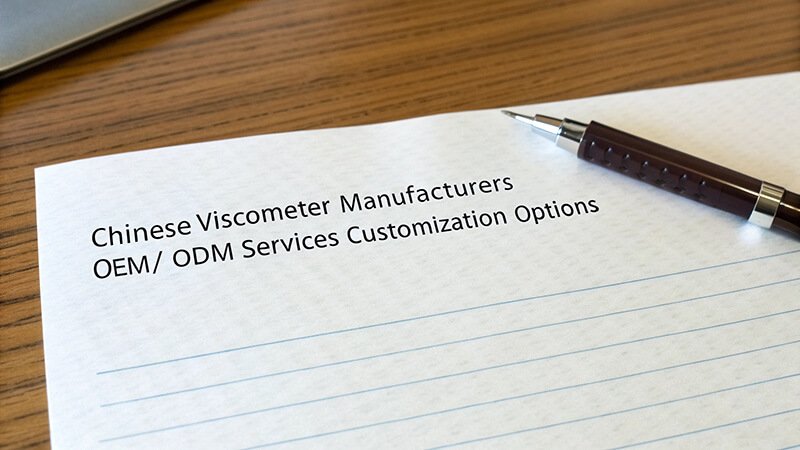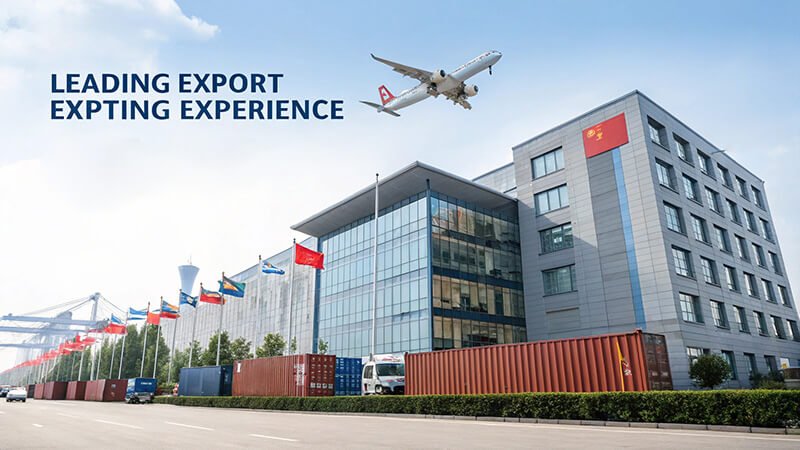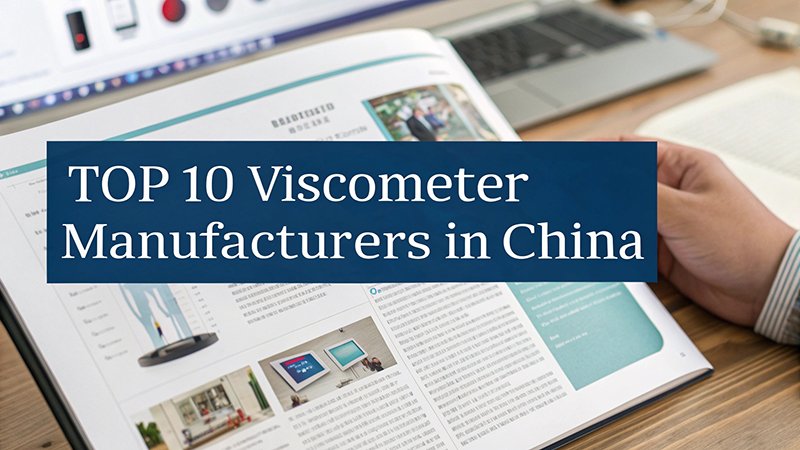Sourcing viscometers from China is smart but can feel risky. Finding reliable partners among many is tough. Get insights to pick the best manufacturers for your business needs.
Pinpointing a definitive 'top 10' list is hard. Focus on manufacturers with proven quality, OEM/ODM capabilities, robust export records, and strong customer support. Martests exemplifies these qualities.
As a manufacturer myself, I often speak with buyers, like Jacky from Italy, who are looking for long-term partners in China. He's learned from his 20 years in the industry that a low price isn't everything. Finding a truly "top" manufacturer, one that belongs in anyone's conceptual 'top 10', involves looking much deeper than just a company name or a flashy website. So, let's explore what really sets leading Chinese viscometer manufacturers apart and what you should look for.
How Do You Choose a Reliable Viscometer Manufacturer in China?
Feeling lost choosing a Chinese viscometer supplier? Many options seem similar. Learn key factors to identify a truly dependable manufacturing partner for your business.
Choose reliable Chinese viscometer manufacturers by checking their experience, product range, R&D, communication, and transparency. Look for suppliers who understand your business needs well.
Choosing the right partner is crucial for distributors like Jacky, who rely on consistent quality and service. It’s about building a relationship
Key Factors for Reliability:
- Company History and Experience: How long has the company been manufacturing viscometers? Years in the business, say over a decade, often mean they have stable processes, have learned from past challenges, and can offer more refined products. A long-standing factory has likely weathered economic shifts and technical hurdles, making them a more stable bet.
- Product Specialization and Range: Do they specialize in viscometers, or is it just one minor item in a vast catalog of unrelated products? A manufacturer focusing on viscometry, like we at Martests do with our rotational viscometers, usually has deeper technical expertise and a better understanding of user applications. Check if their range covers the types of viscometers your clients need.
- Research and Development (R&D) Capability: Does the manufacturer invest in R&D, or do they primarily replicate existing designs? A company with an R&D team can offer more advanced features, better performance, and can adapt to evolving market demands or even work on custom solutions. Ask about their innovation process.
- Communication and Responsiveness: How easy is it to communicate with them? Do they respond promptly and clearly to your inquiries? For international B2B business, especially when dealing with technical products and customization, effective communication in English is vital. Slow or unclear responses can signal future problems.
- Transparency and Willingness to Share Information: Are they open about their production processes? Will they allow a factory visit (if feasible) or offer a comprehensive virtual tour? A transparent manufacturer is usually more confident in their quality and operations. We are always proud to show potential partners our two production lines here in China.
- Customer References and Market Reputation: Can they provide references from other international buyers, particularly from your region like Europe or Southeast Asia? Positive feedback and a good reputation within the industry are strong indicators of reliability. A quick search on platforms like Alibaba or Google for reviews can also be insightful.
| Evaluation Factor | Why It's Important for Reliability | What to Look For |
|---|---|---|
| Years in Business | Stability, refined processes, experience | 10+ years in viscometer manufacturing |
| Product Focus | Deeper expertise, better product quality | Specialization in viscometers or related instruments |
| R&D Investment | Innovation, ability to meet future needs | In-house R&D team, new product pipeline |
| Clear Communication | Smooth transactions, problem resolution | Fluent English, prompt responses, proactive updates |
| Transparency | Builds trust, verifies claims | Willingness for factory visits/tours, open answers |
| Customer References | Real-world validation of quality and service | Testimonials from similar buyers, case studies |
These points help you assess if a manufacturer is just a seller or a potential long-term partner.
What Certifications and Quality Standards Should Chinese Viscometer Manufacturers Have?
Worried about viscometer quality from China? Substandard products cause big problems. Know which certifications and standards indicate a commitment to quality and reliability.
Look for ISO 9001 for quality management. CE marking is vital for Europe. RoHS for material safety. Specific industry standards (ASTM, ISO for viscometry) are also good signs.
Certifications are more than just pieces of paper; they are objective proof of a manufacturer's commitment to quality and safety. For purchasing managers at large instrument distributors, these are often non-negotiable.
Essential Certifications and Standards:
- ISO 9001: Quality Management System: This is the international standard for a quality management system (QMS). A manufacturer with ISO 9001 certification, like our factory Martests, demonstrates that they have established processes for consistently designing, producing, and delivering products that meet customer and regulatory requirements. It means they are serious about quality control at every stage.
- CE Marking: If you plan to sell or use the viscometers in the European Economic Area (EEA), CE marking is mandatory. It signifies that the product conforms with health, safety, and environmental protection standards for products sold within the EEA. We ensure our viscometers destined for Europe have the CE mark.
- RoHS (Restriction of Hazardous Substances): This directive restricts the use of specific hazardous materials found in electrical and electronic products. RoHS compliance is important for environmental protection and is required in many markets, including the EU. It shows the manufacturer cares about more than just function.
- Specific Industry Standards (e.g., ASTM, ISO for viscometry): While not always a "certification" the manufacturer holds, their products should ideally comply with relevant ASTM (American Society for Testing and Materials) or ISO (International Organization for Standardization) standards for viscosity measurement. Ask if their instruments are designed and calibrated according to these internationally recognized methods. This ensures comparability of results.
- Internal Quality Control (QC) Procedures: Beyond external certifications, ask about their internal QC. How rigorous is their testing? Do they test every unit? What parameters are checked? At Martests, our "top quality" promise is backed by meticulous QC checks on our production lines, from incoming components to the final assembled viscometer.
| Certification/Standard | What It Indicates | Importance for Buyers |
|---|---|---|
| ISO 9001 | Consistent quality management processes implemented | Higher product reliability, fewer defects, stable supply |
| CE Marking | Product meets EU safety, health, & environmental needs | Essential for European market access, assurance of safety |
| RoHS Compliance | Restricted use of specific hazardous materials | Environmental responsibility, broader market access |
| ASTM/ISO Compliance | Adherence to established viscometry test methods | Ensures measurement accuracy and data comparability |
| Strong Internal QC | Manufacturer's own commitment to quality | Leads to better product performance and longevity |
Always verify these claims. Ask for copies of certificates and don't hesitate to ask detailed questions about their quality assurance practices.
Which Chinese Viscometer Manufacturers Offer OEM/ODM Services and Customization Options?
Need viscometers with your brand? Or specific features? Finding manufacturers for OEM/ODM can be difficult. Learn what to look for in a flexible Chinese partner.
Many leading Chinese viscometer manufacturers offer OEM/ODM. Look for those with design capabilities, flexible production, and experience with logo customization, like us at Martests.

For many distributors, like Jacky who resells viscometers in Italy under his own brand, OEM/ODM capability is a critical factor. It allows them to build their brand and offer tailored solutions.
Understanding OEM/ODM and What to Look For:
- OEM (Original Equipment Manufacturer): This is where the manufacturer produces a product based on your design or, more commonly for viscometers, applies your company's branding (logo, model number, custom packaging) to their existing, proven product. This is a core service we provide at Martests for our rotational viscometers, helping our B2B wholesale clients.
- ODM (Original Design Manufacturer): Here, the manufacturer designs and produces a new product, which you then sell under your brand. This requires significant R&D and design expertise from the supplier. While less common for highly specialized instruments unless volumes are huge, some larger manufacturers might offer this.
- Key Capabilities for a Good OEM/ODM Partner:
- Proven Product Quality: The base product must be excellent. Customizing a poor-quality instrument is pointless.
- Experience with Customization: Ask for examples of previous OEM projects. How good is their logo application? Can they handle custom manuals or software tweaks?
- Flexible Production: The factory needs to be able to integrate custom runs into their production schedule. Our two production lines at Martests give us this flexibility.
- Reasonable MOQ (Minimum Order Quantity): Customization often involves setup costs, so MOQs are standard. Discuss this early on. A good partner will have clear and fair MOQ policies.
- Intellectual Property (IP) Protection: If you are providing any unique design elements, ensure the manufacturer has a policy on IP protection, although this is more critical in full ODM.
- Clear Communication on Specifications: All customization details must be clearly documented and agreed upon to avoid misunderstandings.
| Service Aspect | What it Involves for Viscometers | Manufacturer Capability Needed |
|---|---|---|
| OEM (Branding) | Applying buyer's logo, model names, custom packaging. | High-quality printing/engraving, flexible packaging solutions. |
| OEM (Minor Mods) | Small changes to features, color, or accessories. | Engineering capacity, adaptable assembly lines. |
| ODM (New Design) | Creating a unique viscometer product for the buyer. | Strong R&D, industrial design, prototyping, extensive testing. |
| Custom Documentation | User manuals, software interface in buyer's language. | Technical writing skills, translation capabilities if needed. |
We find that clear communication and a detailed agreement are key to successful OEM projects.
What's the Export Capability and International Market Coverage of China's Top Viscometer Manufacturers?
Worried about international shipping and support from China? A manufacturer's export strength is vital. Know what indicates strong global reach and reliable delivery.
Top Chinese manufacturers have extensive export experience, dedicated export teams, familiarity with international logistics, and good market presence in regions like Europe, Asia, and the Americas.

A manufacturer might make excellent viscometers, but if they can't get them to you reliably and support them internationally, the partnership won't work. This is especially true for our clients in Europe, Southeast Asia, the Middle East, and South America.
Evaluating Export Strength:
- Years of Export Experience: How long have they been selling internationally? Experience smooths out many potential issues with documentation, shipping, and payment. Ask which countries they export to most frequently.
- Dedicated Export Department: A professional export team that is fluent in English and understands international trade practices is essential. This team will handle your orders, documentation (like Bills of Lading, Certificates of Origin), and communication.
- Familiarity with International Logistics: Do they understand various shipping incoterms (FOB, CIF, EXW)? Can they work with your preferred freight forwarder or recommend reliable ones? Efficient logistics are key to controlling costs and delivery times.
- After-Sales Support for International Customers: This is a big one. How do they handle warranty claims, technical queries, or spare parts for overseas clients? Clear processes for remote support, troubleshooting, and parts dispatch are crucial. At Martests, we prioritize robust support for our distributors.
- Participation in International Trade Shows: Companies that regularly exhibit at international industry events (like those related to laboratory equipment or specific industries) demonstrate a commitment to the global market. It's also a good way for buyers like Jacky to meet suppliers.
- Market Presence and Reputation Abroad: Do they have existing distributors or a known presence in your target markets? Positive feedback from other international customers in your region can be very reassuring. We actively seek strong distributor partners.
| Export Capability Factor | Why It's Crucial for Buyers | What to Verify with the Manufacturer |
|---|---|---|
| Export Track Record | Indicates experience with international procedures. | Ask for main export markets, years exporting. |
| Professional Export Team | Ensures clear communication and proper handling. | Inquire about their export staff and language capabilities. |
| Logistics Know-How | Leads to efficient and cost-effective shipping. | Discuss incoterms, shipping options, and documentation. |
| International Support | Provides peace of mind and operational continuity. | Clarify warranty terms, technical support process, spare part availability. |
| Global Market Engagement | Shows commitment and understanding of markets. | Check for trade show participation, existing international distributors. |
A manufacturer with strong export capabilities will make the entire procurement process, from order to delivery and beyond, much smoother and more reliable.
Conclusion
Finding a "top 10" Chinese viscometer maker means looking beyond names. Focus on quality, OEM/ODM skills, certifications, and export strength for a reliable, long-term partnership.


